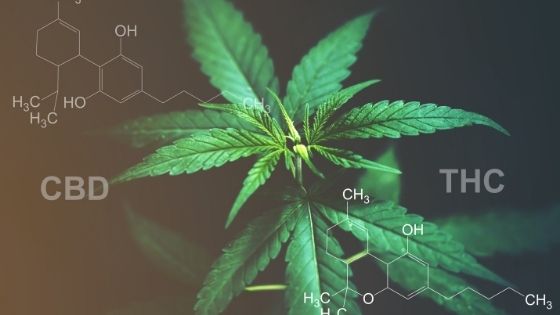When it comes to marijuana, the most common and well-known compound is THC (delta-9 tetrahydrocannabinol). There are also other less commonly known compounds, like THCV (tetrahydrocannabivarin), CBN (cannabinol), and delta-8.
Delta-8 is a form of THC that is legally available in the United States from hemp plants, which are defined under federal law as containing less than 0.3% delta-9 THC. There’s been a lot of talk recently about the potential benefits of this compound—but what exactly is it, and what does it do?


While there haven’t been any conclusive studies on the effects or safety profile of delta-8 THC, we can use what we know about delta-9 and extrapolate based on the two compounds’ similarities. These two forms of THC have different effects when consumed with a dry herb vaporizer and interact with our bodies differently, so they’re not 100% interchangeable—but they do share some similarities in how they work.
Is Delta-8 THC Safe?
You’ve probably heard all the talk about Delta-8 THC—and maybe you’re on the fence about whether or not it’s safe to consume. After all, you’ve heard plenty of stories about how cannabis can cause psychosis, lead to a diminished IQ, and turn otherwise normal people into couch-dwelling stoners. It turns out that those claims are mostly false—but that’s not what we’re here to talk about today. We want to address the safety of Delta-8 THC, a much less common cannabinoid that’s being hailed as the next big thing in cannabis products because of its purported super powers. If you want a delta 8 vape, or a weed vape kyle provides them and you can find more info on their website.
We’re going to break down what you need to know about this cannabinoid and get down to the bottom line: is it really safe? You’ll have everything you need to make an informed decision by the time we’re finished here… so let’s get started!
The first thing you need to know is that there are actually three different cannabinoids that share a similar name: delta-8-, delta-9-, and delta-10-tetrahydrocannabinol (THC). Each one has slightly different effects on your body and mind, and they come from different sources within the cannabis plant
Delta-8 THC is a compound of the cannabis plant, and it has some super awesome features that make it stand out from other compounds. Delta-8 is what’s known as an analog of THC, which is tetrahydrocannabinol, or THC for short. Delta-8 is chemically different from THC by only a few atomic bonds.
So why does this matter? It matters because it makes Delta-8 able to provide some of the same benefits as regular THC (also known as Delta-9), with a little less psychoactive effect. What does this mean for you? It means you can get the awesome feelings and benefits you love from using cannabis without being totally stoned all day long!
Also, did we mention that Delta-8 has anti-nausea properties? That’s right—it helps fight nausea and can even help with cancer symptoms! How great is that?
With all these benefits, it’s pretty easy to see why we’re so psyched about Delta-8! We love its versatility, and we know you will too.
Curious about Delta-8 THC? You’re not alone!
Delta-8 THC is a cannabinoid that’s earned a lot of buzz in the cannabis scene for its ability to provide a high that’s both legal and exciting, without being overwhelming. It’s also been the subject of a lot of misinformation, so we wanted to clear things up and lay out the facts on this unique cannabinoid.
First, what is Delta-8 THC? This compound is found in miniscule amounts in cannabis plants, and it’s one of many different cannabinoids you can find in hemp or marijuana. There are over 100 cannabinoids scientists have discovered so far—so why is Delta-8 THC getting all the attention? The answer has something to do with its legality, and whether it produces a high (or “psychoactive effect”).
Delta-8 THC is unique because it’s essentially a less potent version of Delta-9 THC (which you’ve probably heard of). In fact, the only difference between them is just one atomic bond—but that difference makes all the difference. Delta-9 THC is more potent than Delta-8 and has more psychoactive properties than its cousin. For example, if you’ve ever gotten high from an edible, that was likely thanks to
Thinking about trying Delta-8 THC? Listen, we’ve been there.
When we first started hemp farming in 2018, we were like, “wait, you mean THC is legal now?” And then we were like, “dang, this is a real game-changer for the industry.” And then we were like, “THC is finally legal??? YESSS.” So yeah, we get it. It feels like the wild west of hemp right now—there’s so much new territory to explore and so many different cannabinoids out there.
But while there’s a lot of new research to be done on all the different forms of THC out there, there’s also a lot to learn from what science has already found. That’s why we’re here: to make sure that even if you’re just getting started with your THC exploration, you know what you’re doing and how to keep yourself safe.
So first thing’s first: Delta-8 THC is basically just another form of THC. Some people think it’s less potent than Delta-9 THC (the other form of THC that has been legalized) but really it just feels different when you use it. Some people say Delta-8 gives them more energy and focus than Delta-9 does
Delta-8 THC, a hemp-derived cannabinoid that’s known for its psychoactive effects. Delta-8 THC is similar to delta-9 tetrahydrocannabinol (THC), the most active ingredient in marijuana and a psychoactive compound.
Delta-8 THC has been used to help reduce pain, stress, anxiety and depression. It can also help with sleep.
However, Delta-8 THC can cause some side effects, including dizziness and nausea. Some people have reported feeling “high” when using it.
The agency also noted that Delta-8 THC is not approved for use in food or beverages.
In June 2020, the Food and Drug Administration issued a warning letter to four companies selling products containing Delta-8 THC. The agency said the products are unapproved drugs and are not legal to sell as dietary supplements or food additives.
Delta-8 THC is the latest craze in the cannabis world. It’s a legal, safe alternative to Delta-9 THC that gives users a clear-headed experience without any of the anxiety or paranoia that can come with Delta-9 THC.
The catch? The difference between Delta-8 and Delta-9 is a single atomic bond. This small difference makes all of the difference in how your body processes it.
While Delta-9 binds to both CB1 and CB2 receptors, Delta-8 only binds to CB1 receptors. This means that there are fewer adverse reactions and less intense effects than when taking Delta-9 THC. The result? A psychoactive high that won’t have you reaching for a snack or scrambling for water.
















